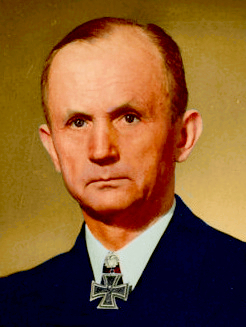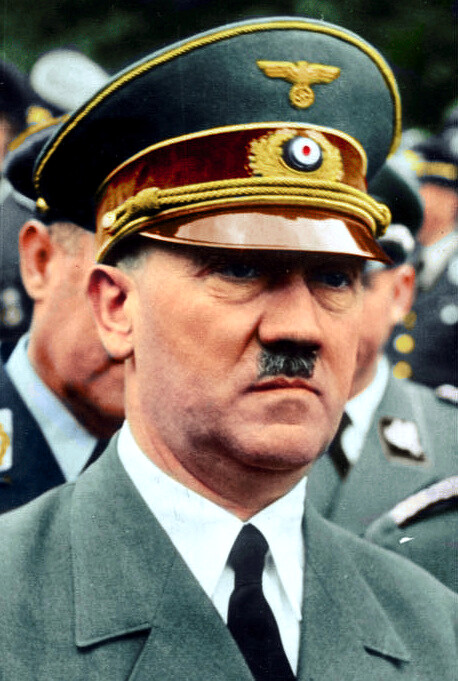Wednesday, May 2, 1945
Highlights on Hitler’s ‘death’
Gen. Eisenhower doubts Nazi version that Hitler died in battle; reveals authentic Himmler report that Hitler suffered stroke and was dying eight days ago.
Surrender of Germany regarded as hastened by elevation of Adm. Doenitz and his ousting of Foreign Minister Ribbentrop.
Doubt cast on report of death by Moscow. Washington skeptical. British believe Hitler is dead; doubt Nazi version.
Goebbels’ death in Berlin regarded as highly probable by well-informed quarters in London.
LONDON, England (UP) – Gen. Dwight. D. Eisenhower said today there was some evidence that Adolf Hitler had died of a brain hemorrhage instead of a hero’s death in battle as the Nazis claimed.
The statement by Gen. Eisenhower was the first from any Allied official to shed light on the mystery of Hitler’s reported death.
Gen. Eisenhower said the enemy claim that Hitler died fighting the Russians in Berlin was “in contradiction of facts” given by Heinrich Himmler at a conference with Count Folke Bernadotte of Sweden at Luebeck eight days ago.
Himmler and a Gen. Schellenberg, who accompanied him to the conference, said Hitler had a brain hemorrhage and could not live 48 hours and even then might be dead, Gen. Eisenhower said in a statement issued through Supreme Headquarters in France.
Through neutral source
Even though this version of Hitler’s death was based on Nazi information, it had the merit of coming to Gen. Eisenhower through Count Bernadotte, a neutral. Observers were inclined to put more credence in the Himmler version than in the melodramatic account broadcast by the Hamburg radio yesterday.
A high British source at the San Francisco conference told the United Press Saturday that Hitler had suffered a stroke and could not live more than 24 hours. That raised the possibility that Hitler’s death might have been covered up for two or three days to give time to build up a legend of a hero’s death.
Germany finished
Himmler admitted that Germany was finished, Gen. Eisenhower said in the official confirmation of the Luebeck conference. Bernadotte said in Stockholm yesterday that he could make no disclosure of his activity as the reported intermediary in Nazi-Allied negotiations.
Gen. Eisenhower said the radio statement by Adm. Karl Doenitz, announcing Hitler’s death and proclaiming himself as his successor, represented an attempt to drive a wedge between the Russians and Anglo-Americans.
The attempt “will be as completely ineffective as many previous efforts which have been made,” Gen. Eisenhower said. “Nothing which either Doenitz or Himmler may say or do can change in any way the agreed operations of the Allied Armies.”
Doenitz was reported already to have ousted Joachim von Ribbentrop as foreign minister in what may be the first move toward trying to save Germany from further battering.
London circles with excellent sources circulated a report that Propaganda Minister Paul Joseph Goebbels probably had died in Berlin with Hitler.
Radio Hamburg, voice of the new Doenitz government, said the admiral had appointed British-educated Count Ludwig (also known as Lutz) Schwerin von Krosigk, 58-year-old nephew of the late Kaiser Wilhelm, as foreign minister.
Allied and neutral sources predicted that the death – real or fictional – of Hitler, and elevation of Adm. Doenitz to Fuehrer will hasten Germany’s collapse.
Belief persisted in London that victory in Europe will come this week. Prime Minister Winston Churchill conferred with his cabinet until early this morning on the swift sequence of events.
No Churchill statement
In the House of Commons, the question period passed today without any statement by the Prime Minister on the war situation or Hitler’s reported death.
German preparations to quit Denmark and possibly even Norway continued in what Stockholm suggested was the first step toward Germany’s full capitulation.
The first meeting of top-ranking Allied and German officials on the Western Front was disclosed by Supreme Allied Headquarters. It resulted in an agreement to ship food by air, sea and highway into German-occupied Holland, and a dispatch from headquarters added:
“The implications of a face-to-face meeting of high SHAEF and German officers at this time are obvious.”
Lt. Gen. W. Bedell Smith, chief of staff to Gen. Dwight D. Eisenhower, headed the Allied delegation and Arthur Seyss-Inquart, governor of German-occupied Holland, the German group.
Rhodes scholar
The new German Foreign Minister Schwerin von Krosigk, a former Rhodes scholar at Oxford, speaks fluent English and it was suggested that Doenitz may have called upon him as a man capable of negotiating with the Allies.
He was Minister of Finance in Adolf Hitler’s government, but had been active in German politics long before Hitler’s advent. He became head of the German budget department in 1929 and served in the von Papen and Schleicher cabinets before Hitler came into power.
Like all members of the Hitler government, Schwerin von Krosigk was made a member of the Nazi Party. But he was regarded the least Nazi of those in the cabinet.
Radio Hamburg made no mention of Ribbentrop. He was last reported in Southern Germany two weeks ago.
Goebbels last in Berlin
London sources which reported that Goebbels may have died with Hitler in Berlin pointed out that he had not been mentioned by the German radio for more than a week, though as Nazi leader of the capital he then was directing its defense.
Thus, within six days, four of the top Nazi leaders of Germany have disappeared from the scene – Hitler, Goebbels, Ribbentrop and Reich Marshal Hermann Goering. The German radio announced last Friday that Goering had resigned as commander of the Luftwaffe because of poor health.
Whereabout and status of the other top Nazi, Gestapo Chief and Interior Minister Himmler, were not known. Doenitz did not signify immediately whether he considered Himmler part of his regime.
The surrender of German forces in Denmark may already be underway. A Stockholm dispatch to the London Evening News said that German naval forces in Denmark had begun to surrender.
Norway reports conflict
Conflicting reports were received from Norway. Some said the Germans were determined to fight to the death there, but others asserted the surrender of those forces was also likely.
One source said Doenitz had discharged Adm. Otto Ciliax, German naval commander in Norway, because he desired to capitulate. Adm. Theodor Kranke, formerly assistant to Gen. Fritz Boehme, German Army commander in Norway, was named to succeed Ciliax, it was said.
The announcement of Hitler’s death met a mixed reception in Allied capitals.
A British Foreign Office commentator said there appeared little doubt that Hitler was dead. Far from dying a “hero’s death,” however, the spokesman said all reliable reports indicated the Fuehrer died of a stroke.
Moscow sees trick
Moscow, on the other hand, inclined to the belief that the death report was a blind to enable Hitler and his henchmen to go underground.
Allied officials expressed surprise at Doenitz’s announcement that Hitler had designated him rather than Gestapo Chief Himmler as his successor.
They theorized, however, that Himmler must have approved the appointment since he still controlled the dreaded, all-powerful SS and Gestapo, without whose support no German official could remain in office.
Himmler may have decided that Doenitz as a non-war criminal might better be able to deal with the Allies.
Allied authorities were far from convinced that Hitler actually was dead.
One British official said he would have to see Hitler’s body before he would believe the Nazi leader was dead. Measurements of Hitler’s head taken by doctors before the war might clinch final identification.
Fight on, Doenitz says
Announcing Hitler’s death over the Hamburg radio last night, Doenitz called on the German Army to continue the struggle against Bolshevism “until the fighting troops and hundreds of thousands of families of the German eastern territories are rescued from enslavement or extermination.”
“Against the British and the Americans,” he said, “I shall continue the struggle in as far and so long as they will hinder me in carrying out the fight against Bolshevism.”
Observers pointed out that Doenitz’s anti-Bolshevist pronouncements followed the pattern laid down by Himmler who within the past fortnight offered to surrender Germany unconditionally to the United States and Britain.
The Western Allies replied that surrender could only be accepted if addressed to Russia as well. A British spokesman reiterated last night that Doenitz’s emergence as Fuehrer would have no effect on the Allies’ demand for Germany’s unconditional surrender to all of the “Big Three.”

